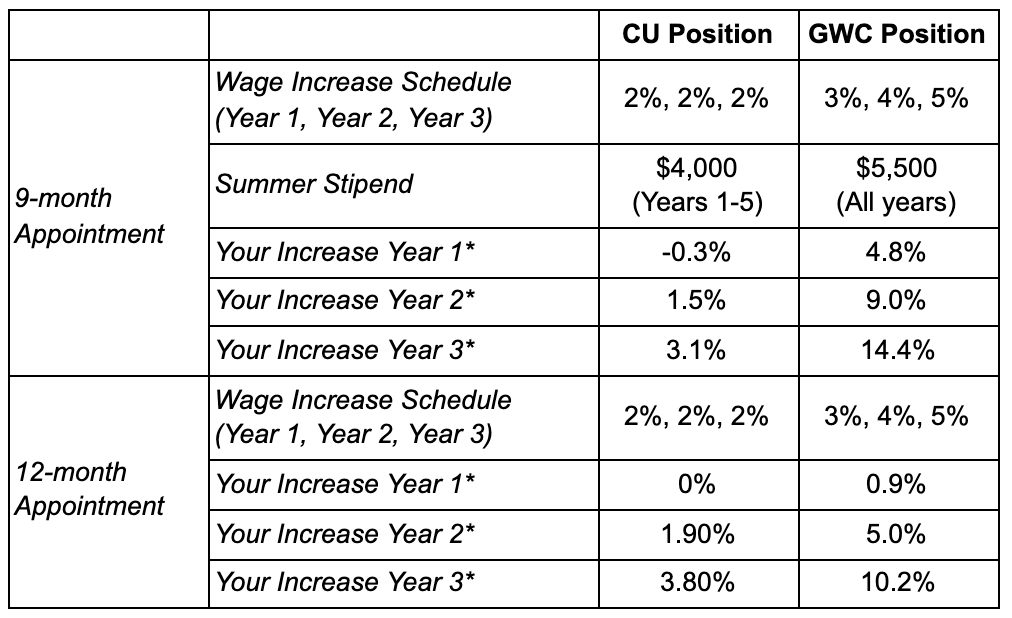Our next General Body Meeting is scheduled for tomorrow, Friday, April 2, 3-4:30 PM ET (registration link).
TLDR: #CUonStrike We put forward a new package of proposals last session that addresses the remaining articles on the table. While Columbia’s response was lackluster, they have offered to walk us through their cost estimates during next session to help progress towards an agreement.
Bargaining Update
On Tuesday, March 30, we presented to the University a new package of proposals. Packaging articles together allows us to approach the remaining issues holistically and simultaneously provides us with the right to make different proposals if the University does not accept the package as proposed.
The major changes from our previous positions to those in the package were all economic in nature. Columbia has expressed multiple times that they foresee financial difficulties over the next year due to the pandemic. In recognition of this, our package shifted costs away from the first year of the contract, while still providing the same level of benefits by Year 3 of the contract.
-
Health Benefits: Our previous proposal stipulated that the University would cover 60% of PhD dental premiums throughout the length of the agreement. The new language proposes that the University covers 30% of PhD dental premiums in Year 1, 50% in Year 2, and 70% in Year 3.
-
Fee Waivers: Similarly, our new fee waivers article grows the portion of the health service fee that will be covered for Masters workers on appointment from 50% in Year 1, to 75% in Year 2, and 100% in Year 3.
-
Compensation:
-
We moved the hourly minimum wage to $20/hour for undergraduate student workers and $25/hour to graduate student workers.
-
We adjusted the wage increase schedule to 3% in Year 1, 4% in Year 2, and 5% in Year 3 of the contract. Below is a table that breaks down what that means for Phd workers.
-

*These numbers have been adjusted for 2% union dues as well as a 2.0% inflation rate.
In response, the University passed a revised Health Benefits proposal, in which they allocated more money to the Support Fund and clarified that it can be used for any out-of-pocket medical, dental, and vision expenses. The new fund grows from $200k in Year 1 to $225k in Year 2 and $250k in Year 3. However, this was the only proposal the University passed, and they maintain that we are still too far apart on economics. They have offered to walk us through their cost estimates as a next step toward reaching an agreement.
We will continue to bargain this week in hopes of coming to an agreement quickly. We encourage everyone to continue to demonstrate our power by signing up for in-person picketing here and virtual picketing here (zoom registration).
Our next bargaining session is scheduled for Thursday, April 1, 3:30-5 PM ET. RSVP using this link if you would like to attend the session via Zoom.
Information about UAW Strike Assistance and Hardship Funds
Workers on strike can apply for the UAW Strike Fund for $275 a week. In order to qualify, workers must spend 10 or more hours a week at the picket line, either virtual or in-person (we encourage workers to join the picket line for 20 hours or more per week). Workers who require an exemption due to time zone differences or other circumstances can apply for an exemption using either of the picket sign-up links (virtual or in-person). Both U.S. citizens/residents and international student workers are eligible to apply for and receive the UAW Strike Fund if they have a U.S. social security number.
Additionally, undergraduate students supportive of our strike have started a hardship fund, separate from the UAW Strike Fund. This need-based fund will be distributed by a Hardship Fund Committee of GWC. You can apply for the hardship fund at this link. If you have any questions about the application process, or if you would like to get involved with the hardship committee, please contact us at gwchardshipfund@gmail.com.
